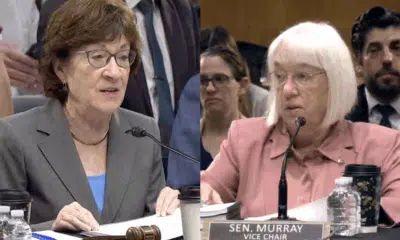(The Center Square) – With Democrats still playing hardball over confirming the rest of President Donald Trump’s civilian nominees, Republicans are becoming increasingly vocal about changing Senate procedural rules to help fast-track the process.
Democrats haven’t allowed a single civilian nominee to pass by voice vote or unanimous consent, which would drastically speed up the confirmation process. Senate Majority Leader John Thune, R-S.D., has called Democrats’ tactics “a historic level of obstruction” and urged them to “rein in their reflexive anti-Trump sentiment.”
With more than 130 nominees remaining, Sen. Mike Rounds, R-S.D., told reporters earlier this week that Senate Republicans plan to take up some kind of rules reform legislation when they return from recess in September.
This so-called “nuclear option,” implemented by a simple majority vote, could include cutting down on debate time, allowing more than one nominee confirmation per vote, or abolishing procedural votes on nominees entirely.
“What Chuck Schumer has done is slow down the process. Typically, by now, 70% of the President’s nominees are confirmed through a short process, a short pass called unanimous consent,” Sen. Roger Marshall, R-Kan., said Wednesday. “But Chuck Schumer is making us spend two hours at a minimum on every one of those.”
Trump also threw his support behind a rules change after nominee-related negotiations between Republican and Democratic leaders apparently blew up. According to a Trump social media post Wednesday, Schumer had demanded the administration release some $2 billion in withheld federal funds in exchange for Democrats’ cooperation.
“This has never happened before. There has never, in U.S. history, been such a delay. THEY ARE EXTORTIONISTS!,” Trump wrote, referring to Senate Democrats. “Republicans must create legislation in order to get out of the grasp of these Country hating THUGS. Move quickly!!!”
This “nuclear option” is not unprecedented. Democrats used it in 2013 to limit debate time and more easily invoke cloture on all nominees except U.S. Supreme Court appointees, while Republicans extended that to include SCOTUS nominees in 2017.
“So when anyone tells you Republicans are taking the ‘nuclear option’ with President Trump to change the Senate rules, remind them that DEMS started this in 2013,” Sen. Markwayne Mullin, R-Okla., said on X Wednesday. “We’re working through rule change options with the Trump White House to expedite nominees, end the gridlock, and clear the backlog.”
If Republicans do change Senate rules, it would also allow lawmakers more time to pass the 12 annual appropriations bills providing funding for the federal government in fiscal year 2026. So far, the Senate has only passed three of those bills via a minibus, which still needs the House’s approval.
If Congress is unable to pass all 12 funding bills by Sept. 30 – the end of fiscal year 2025 – they will have to pass a short-term Continuing Resolution, or CR, to prevent a government shutdown.




















































